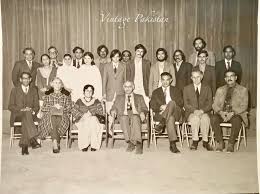
Daud Kamal was a renowned Pakistani poet, writer, translator, and critic. He was born on March 31, 1935, in Jhelum, British India, and passed away on December 5, 1987, in Islamabad, Pakistan.
Kamal completed his early education in Jhelum and Lahore, before moving to England to study at the University of Cambridge, where he earned a degree in English Literature. After completing his studies, he returned to Pakistan and worked as a professor of English literature at Quaid-i-Azam University in Islamabad.
Career and Achievements of Daud Kamal
Daud Kamal is best known for his contributions to Pakistani literature.
He wrote poetry in both Urdu and English and is widely regarded as one of the most significant poets of his generation.
His work was deeply influenced by his experiences of displacement and dislocation, as well as by his interest in Sufism and the works of the poet Rumi.
In addition to his own poetry, Kamal was also a prolific translator and critic.
He translated the works of many famous poets, including Rumi, Goethe, and Shakespeare, into Urdu.
He also wrote extensively on the works of other poets and authors, and his critical essays are considered some of the most insightful and perceptive in Pakistani literature.
The Kite Runner Themes and Quotes-Complete Analysis
Major Works of Daud Kamal

Here is an overview of some of Daud Kamal’s major works:
“Kaghaz Ki Kashti” (The Paper Boat):
This is one of Kamal’s most famous Urdu poetry collections. It explores themes such as love, nostalgia, and the transience of life.
“Shab-e-Aahat” (The Night of the Attack):
This Urdu poetry collection is known for its exploration of the theme of violence, particularly the violence that accompanied the partition of India and Pakistan.
“Chup Ki Awaz” (The Sound of Silence):
This is another Urdu poetry collection by Kamal. It is known for its exploration of the theme of silence, and how it can be both peaceful and oppressive.
“The Lover’s Response“:
This is a collection of Kamal’s English poetry. It explores the theme of love, and how it can be both a source of joy and pain.
Translations:
Kamal was also a prolific translator, and his translations of the works of famous poets such as Rumi, Goethe, and Shakespeare are highly regarded. His translations helped to introduce these poets to a new audience in Pakistan.
A Case of Exploding Mangoes Summary, Analysis & IMP Themes
Major Themes of Daud Kamal’s Poetry
Daud Kamal was a poet who explored a range of themes in his poetry, both in Urdu and English. His work is known for its emotional resonance and its ability to capture the complexities of the human experience. Here are some of the major themes that are often found in his poetry:
Love:

Kamal’s exploration of the theme of love is evident in his poem “Beloved,” in which he writes, “Beloved, every atom of my being is filled with your essence / Your love flows in my veins like a river, carrying me to eternity.” In other poems, Kamal explores the transformative power of love and its ability to bring joy and pain.
Spirituality:

Kamal was deeply interested in Sufism, and his poetry often reflects his spiritual beliefs. In “The Beloved’s Eye,” he writes, “In the eye of the Beloved, I see a thousand worlds / Each more beautiful than the last, each leading me closer to the truth.” Kamal explores themes such as enlightenment, transcendence, and the search for meaning and purpose.
Human Condition:

Kamal’s poetry often explores the human condition, particularly in the context of the political and social upheaval of Pakistan’s early years. In “The Dispossessed,” he writes, “We wander the streets like ghosts, / Our homes and families left behind / The pain of our loss etched into our souls.” Kamal expresses the disillusionment, uncertainty, and displacement experienced by many Pakistanis during this time.
Nature:
Nature is a recurring theme in Kamal’s poetry. In “The River,” he writes, “The river flows like a silver ribbon / Twisting and turning through the hills / Its song echoes through the valleys / Filling the air with the joy of life.” Kamal celebrates the beauty and power of the natural world, and often uses images from nature to explore human emotions and experiences.
Violence:
Kamal’s poetry also explores the theme of violence, particularly in the context of the partition of India and Pakistan. In “The Night of the Attack,” he writes, “The night is dark and full of terror / The sound of gunfire echoes through the streets / The blood of the innocent stains the ground.” Kamal expresses the pain and trauma experienced by those who were forced to leave their homes and families, and the ongoing impact of violence on society.
Transience:

Kamal’s poetry often explores the theme of transience, or the fleeting nature of life. In “The Passing of Time,” he writes, “The seconds slip away like grains of sand / Time is a river, forever flowing / We cannot hold onto it, no matter how hard we try.” Kamal reflects on the impermanence of human existence, and the importance of living fully in the present moment.
Silence:
Another recurring theme in Kamal’s poetry is silence. In “Silent Sea,” he writes, “The sea is silent, its voice lost in the wind / Yet beneath the waves, a world of life exists / Silent, but full of beauty and mystery.” Kamal explores the different meanings and implications of silence, from the peaceful silence of nature to the oppressive silence of political repression.
Overall, Daud Kamal’s poetry is marked by its depth and complexity. He explores a range of themes, often using vivid imagery and powerful language to convey his ideas. His work continues to be celebrated and studied for its emotional resonance and its ability to capture the complexities of the human experience.
Legacy of Daud Kamal
He is a major figure in the development of Pakistani literature and his contributions to Urdu and English poetry continue to be studied and appreciated.
Advancing Pakistani Literature:
Kamal’s work was instrumental in advancing Pakistani literature both in Urdu and English. His poetry explored themes that were previously not explored in Pakistani literature, and his translations helped to introduce Western literature to a new audience in Pakistan.
Contributions to Literary Criticism:
Kamal’s critical essays are considered some of the most insightful and perceptive in Pakistani literature. His work on the works of other poets and authors helped to promote literary appreciation and analysis in Pakistan.
Influence on Other Writers:
Kamal’s work has influenced other writers in Pakistan and beyond. Many poets and writers have cited Kamal as a major influence on their own work.
Celebrated Posthumously:
Despite his relatively short life, Kamal’s work has continued to be celebrated and studied. His poetry has been translated into many languages, and he is still widely regarded as one of the most important poets of his generation.
Death of Daud Kamal
- Kamal passed away on December 5, 1987, in Islamabad, Pakistan.
- His death was a great loss to Pakistani literature, and he is still remembered and celebrated today as one of the country’s greatest poets and thinkers.
Daud Kamal was a prolific Pakistani poet, writer, translator, and critic. His work explored complex themes and was deeply influenced by his experiences of displacement and dislocation. Despite his relatively short life, Kamal left a lasting impact on Pakistani literature and is still widely regarded as one of the country’s greatest poets and thinkers.



